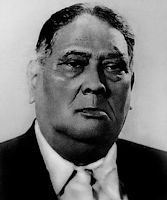Muhammad Shahidullah was born on 10 July 1885 at Peyara Village of 24 Parganas, West bengal, India. He was a writer, educationist, philologist and linguist. He is a celebrated philologist and regarded as a national pride of Bangladesh for of his many glorious contributions to Bengali Heritage, language, culture, national identity, educational, religious, political and social reconstruction. He discovered the root of Bengali language and terminology. Acquiring eloquence in 18 classical languages Muhammad Shahidullah was an example of endless effort and scholarship. He picked up quite a few languages in his school life viz. Urdu and Persian to maintain family tradition, Bengali, English and Sanskrit at school to fulfill academic requirement and Hindi and Udiya from neighbours in Howrah.
Shahidullah broke away from family tradition of Khadim (Warden) to Pir Gorachand shrine and studied language instead. In 1899 he passed school examination where he offered Sanskrit at third language. Self-taught other languages including Perisan, Urdu, Hindi and Oriya.






